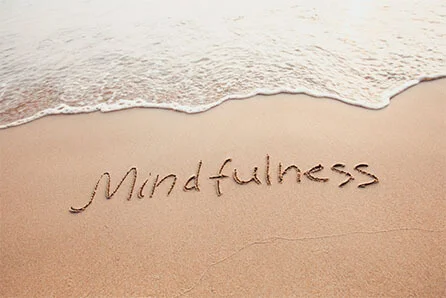Mindfulness is a word we hear quite often these days and although it is a relatively new concept for many, like meditation, it has actually been around for a very long time. So let’s take a moment to look at what mindfulness is, what it isn’t and what it can bring to the table from a mental health perspective.
What this guide covers
- What does it mean to be mindful?
- The difference between mindfulness and meditation
- The benefits of mindfulness
- Ways to practise it everyday
- How mindfulness can help with anxiety & depression
What does it mean to be mindful?
Mindfulness is the practice of being in the present moment. Rather than dwelling on the past or worrying about the future, it is a state of awareness of one’s current sensations, thoughts, bodily state and environment, experienced in a totally objective and non-judgmental way.
Learning to be mindful involves learning to transport yourself into this state where you step back from your normal emotional reactions to things and see life more objectively, without getting swept up in the feelings.
To attain a state of mindfulness, you need to practice on a daily basis, sitting in a quiet place and focusing on your breathing and the sounds and sensations around you. Over time, you will learn to tune out the constant chatter of your thoughts and be aware only of the present.
Mindfulness vs meditation
All this might sound a bit like meditation and in fact that’s what it is. Mindfulness can be practiced both informally and formally. Informally, it’s a general awareness of the world and formally, it’s a type of meditation known as mindfulness meditation. Which is one of the most popular forms of meditation.
The goal of becoming truly mindful is to learn to be able to exist in the present naturally, without needing a formal meditation exercise, to the extent that you’re so aware of the now that when confronted by life’s challenges, you’re able to take a step back and react objectively rather than emotionally.
Benefits of mindfulness
So what is the point of all this mindfulness you may ask? What use is it in our everyday lives? According to those who practise it, mindfulness has a range of benefits including;
- Body awareness – by knowing your internal emotional state, you are better able to regulate your own emotions.
- Focus – mindfulness improves your ability to focus on a task without being distracted by your thoughts.
- Self-perception – mindfulness increases self-knowledge, which in turn increases self-esteem and self-acceptance.
- Physical wellbeing – mindfulness meditation has been shown to have health benefits such as reduced blood pressure and cortisol (stress hormone) levels.
Mindfulness is also believed to have other benefits such as improving memory, stress management, satisfaction with relationships and quality of life.
Ways to practise being mindful everyday
A mindful person focuses on the present moment and sees things as they are, rather than influenced by past experiences or future fears. Some simple ways to encourage mindfulness into your everyday life can include;
- Observation – focus on a natural object in your environment and explore every aspect of it visually, as if you are seeing it for the first time.
- Listening – listen to a song objectively, without any preconceptions (i.e. regardless of whether you like it or not).
- Awareness – stop and consider a daily task you are performing to attain a greater appreciation of the intricacies that go into making it happen.
- Immersion – rather than labouring at a chore just to get it over with, fully immerse yourself in the process and experience it like never before.
There are also more formal ways to practise mindfulness such as those espoused in tai chi, yoga and zen and the best way is to experiment with various formal and informal activities until you find your own way to be fully in the moment.
Can mindfulness help with anxiety and depression?
People who suffer from anxiety and depression are exposed to a lot of negative thoughts, feelings and beliefs about themselves. Teaching them to think in the moment is believed by many professionals to be a way of helping them to recognise what it is happening to them and to use that awareness to engage in a different way.
Mindfulness allows for more adaptive reactions to challenging situations and a lot of research has been done into whether it can help to reduce anxiety and depression.
And the results are very promising. Mindfulness is now starting to be used in the treatment of some mental illnesses and institutions such as the Oxford Mindfulness Centre are currently researching the efficacy of mindfulness as a therapy for depression.
Other examples of the increasing interest in the powers of mindfulness include the work of Harvard researchers who are using scans to determine whether mindfulness can change the brains of those with depression and the growing use of Mindfulness-Based Cognitive Therapy (MBCT) as a therapeutic tool; a program which was developed over a decade ago to treat people with histories of depression.
If you suffer from anxiety or depression and are exploring the potential benefits of mindfulness on the advice of your therapist, a peaceful retreat may be just what you need.
Palladium Private is a private mental health provider that tailors their programs to facilitate each client’s rehabilitation process. To find out more about how Palladium Private compares with other services and what a mental health retreat can do for you, click here.



